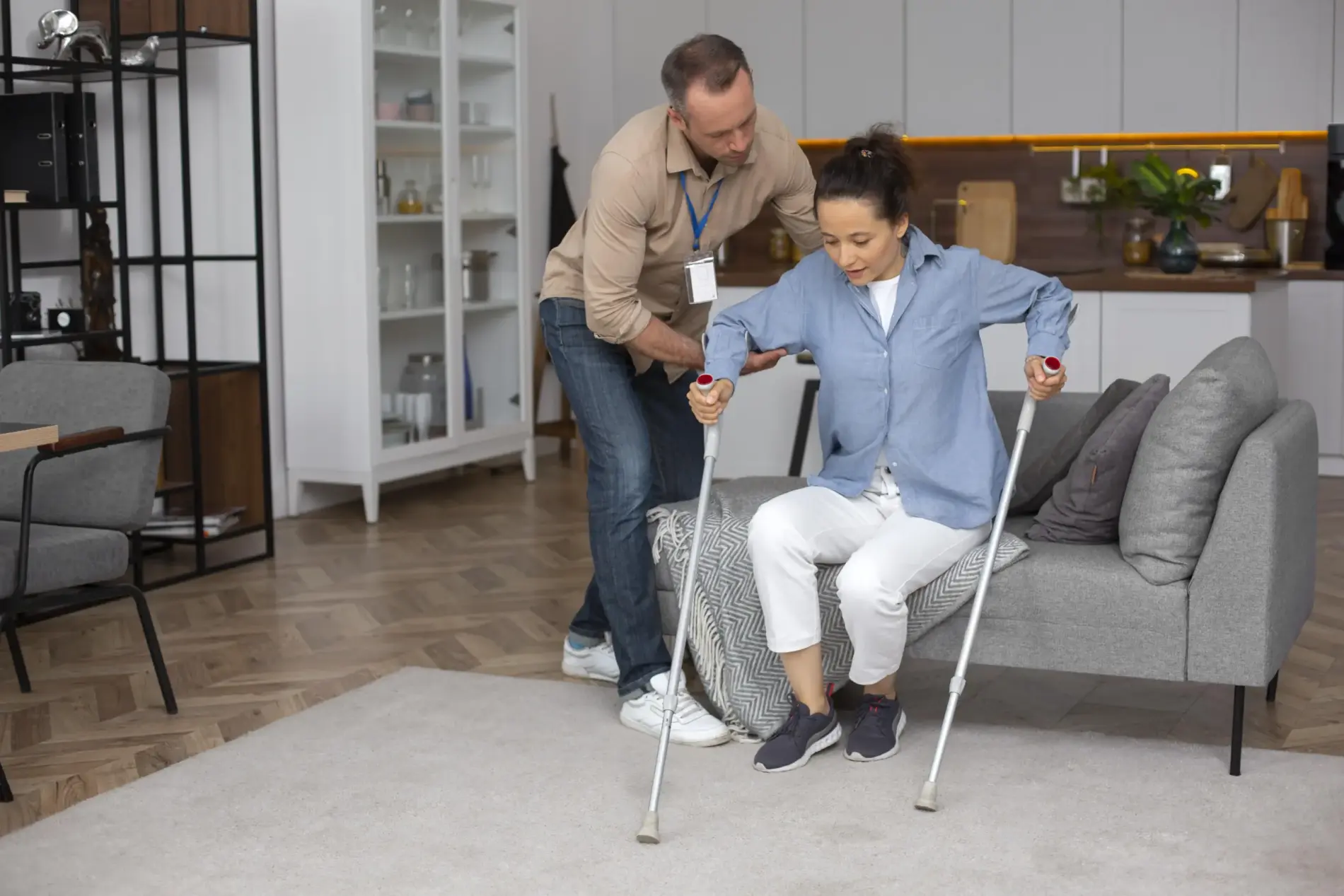Let’s talk about prevention — not just recovery
When most people think about physical therapy, they picture rehab — getting help after an injury, surgery, or hospital stay. But here’s the truth: the best PT doesn’t start when something goes wrong. It starts before the fall, the fracture, or the ER visit.
That’s where in-home physical therapy shines.
Whether you’re in your 60s and noticing a little wobble on the stairs or in your 80s and wanting to stay independent as long as possible, in-home PT is the single most effective way to identify risks early, build strength and confidence, and keep you safe in your own space.
Why Falls Happen — And Why PT Is the Answer
Before we dive into the “how,” let’s talk about the “why.”
According to the CDC, more than 14 million older adults in the U.S. experience a fall every year. That’s 1 in 4 people over 65 — and the risks grow with age, certain health conditions, and medications.
Why falls happen:
● Muscle weakness and poor balance — Our muscles naturally lose strength with age, especially in the hips, legs, and core.
● Changes in vision or hearing — Reduced sensory input means slower reaction time.
● Medications and health conditions — From blood pressure meds to neuropathy, small changes can create big risks.
● Environmental hazards — Rugs, dim lighting, clutter, uneven outdoor surfaces — the list goes on.
In-home PT addresses all of these risk factors — not just one or two. It’s a whole-person, whole-environment approach.
Why In-Home PT Works
In-home PT isn’t just about convenience — though let’s be honest, not fighting for a parking spot on Michigan Street is a perk. It’s about context and customization.
When your PT meets you in your own home, they’re able to:
1. See your “real life” setup
We look at your stairs, your flooring, your favorite recliner, even your pets (yes, we know your cat loves to dart underfoot). This allows us to identify and fix hazards right away.
2. Build a plan that fits you
No cookie-cutter exercises here. Your program is built for your strength, your schedule, and your goals. Want to keep walking around Reeds Lake? We’ll make sure your plan supports that.
3. Start where you are
Maybe you’re nervous after a recent trip or fall. Maybe you haven’t exercised in years. In-home PT lets us meet you where you’re at — physically and emotionally.
The Science Behind In-Home PT
This isn’t just anecdotal. Research consistently shows that in-home balance and strength programs work.
● The Otago Exercise Program — a structured, PT-guided balance and strength program — reduces falls by 35–40% in older adults.
● Home hazard assessments combined with personalized exercise plans reduce fall-related injuries by 26% (NCOA).
● Early intervention (before a fall occurs) lowers hospitalization rates and keeps older adults independent longer (APTA).
What In-Home PT Looks Like
Here’s what you can expect when you schedule an in-home fall-prevention visit with us at Vitality At Home:
Step 1: A Comprehensive Assessment
We start with a full evaluation that includes:
● Balance and gait testing – Timed Up & Go (TUG), Berg Balance Scale, or Mini-BESTest to name a few
● Strength assessment – Especially in your hips, quads, and core.
● Flexibility and mobility checks – Looking for tightness or stiffness that affects stability.
● Sensory screening – Vision, hearing, and proprioception all play a role.
● Medication and medical history review – Certain prescriptions can increase dizziness or fatigue.
● Home safety walkthrough – Lighting, flooring, furniture layout, stairs, and more.
Step 2: A Customized Plan
Your plan will likely include:
● Strength and balance training – Using evidence-based exercises.
● Gait training – Practicing safe, confident walking on different surfaces.
● Task-specific drills – Like getting in and out of a car, reaching overhead safely, or carrying laundry baskets without losing balance.
● Education – On safe footwear, hydration, and how to recover from a near fall.
Step 3: Progress and Support
In-home PT isn’t a “one-and-done” visit. We monitor your progress, adjust your plan as you improve, and check in regularly to keep you safe and motivated.
Why In-Home PT Is Different
What makes in-home PT unique compared to group classes or clinic visits?
|
Feature Customized exercises Home hazard assessment Convenience One-on-one attention Environment-specific training |
Group Class x x x x x
|
Clinic Visit
x
x |
In-Home PT
|
The personalized attention and real-life application you get from in-home PT simply can’t be matched.
Safety Tips You Can Start Today
Even before your first PT visit, there are things you can do now to lower your risk:
● Clear pathways of clutter.
● Add non-slip mats in the bathroom and kitchen.
● Make sure stairways are well lit.
● Keep your phone or an alert system with you when moving around the house.
● Wear supportive, well-fitting shoes — ditch the slippery socks.
Local Options for Grand Rapids
If you’re in West Michigan, here are a few ways to get started today:
● Vitality At Home – Personalized in-home assessments and custom fall-prevention programs.
● Mary Free Bed YMCA – Classes for seniors focused on balance and strength.
● Grand Rapids Senior Centers– Group fitness and activity programs to keep you moving. If you are not in GR, there are even more seniors centers than listed on this link. Let us know if you are looking for one in your area and we can help
● Area Agency on Aging of West Michigan – Resources for home safety and fall-prevention support.
The Bottom Line
In-home physical therapy isn’t just about recovery. It’s about prevention — building strength, confidence, and safety into your everyday life before a fall ever happens.
If you’ve noticed small changes — a little wobble, a near miss, or just feeling less steady than you used to — now is the time to act. Because the sooner we start, the better your outcomes will be.
Ready to get started? Schedule your in-home fall risk assessment today. Let’s keep you strong, steady, and doing the things you love — for years to come.



